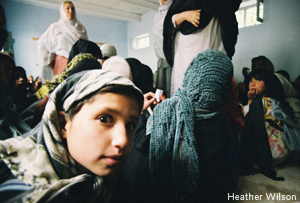aid worker
IN EARLY AUGUST 2010, 10 aid workers were murdered, execution-style, in the province of Badakhshan, in northeastern Afghanistan. Among them were six Americans, two Afghans, a Briton, and a German, all part of a medical mission. It was the deadliest attack on aid workers the country had seen.
Dan Terry, 63, an American humanitarian who, with his family, had called Afghanistan home for more than 30 years, was among the dead.
What compels a person to risk his or her life in a foreign land so riddled with conflict? For Terry it was simple—he was called to a life of peacemaking and service.
A friend of Terry's since childhood, writer Jonathan Larson draws us into Terry's passionate character and the vision he shared with friends in Afghanistan: reconciliation and dialogue. "In the end, we're all knotted into the same carpet," Terry was fond of saying. From a swath of interviews with family, friends, and colleagues, both Western and Afghan, Larson has assembled "oral narratives," sharing with us the exhilarating life of a generous and gentle man, heroic but humble.
The best advice I received as a humanitarian aid worker in Afghanistan was from a leader cut from the same cloth as Terry: "Make no assumptions" and "listen first." We too often accept media caricatures of the other, labels that shut down discourse and clamp off possibility and hope. Challenging this, Terry insisted on the unwavering potential of each person he met. "Categorical 'enemies' have rescued me ... again and again," he once wrote to friends.

During interviews with more than a dozen Afghan women leaders, researchers, international aid workers and former Afghan government officials, we learned of persistent dangers and threats to the country's future.
Afghan women face continuing repression. They are witnessing the erosion of previous gains as Taliban control spreads in the countryside and reactionary warlord influence increases within the Kabul regime. The government's own security forces are often responsible for violations of women's rights. Check back in a few days for a more detailed account of what we learned.
The withdrawal of foreign forces will produce an economic crisis for the government of Afghanistan, which remains almost completely dependent financially on the U.S. and other foreign governments, especially to pay for its huge 300,000-person security forces. I wrote about this funding failure in an earlier post.
A new security agreement between Kabul and Washington is likely to call for the continued presence of U.S. military forces in the country beyond the 2014 transition deadline. This is seen as necessary to provide security for Kabul, but it could also have the effect of prolonging the insurgency and impeding prospects for reconciliation.
It was clear from what we heard that maintaining security requires more than deploying a large number of troops.
In recent weeks, Facebook and other social media have clearly demonstrated their capacity to do far more than just allow us to keep in touch with our family and friends. They have proven to be powerful organizing tools, capable of assisting in the creation of broad international movements for social change. Social media has proven to be a particularly powerful tool in countries in which basic democratic rights such as a free press and the right to assembly are severely restricted. At the same time, Facebook and YouTube are increasingly rendering international borders as meaningless. Western media coverage of the recent popular uprising in Egypt consistently emphasized the catalytic role of Facebook in galvanizing youth and young adults to take action against an entrenched regime that had long been viewed as impenetrable. In the days after Mubarak's departure, both the New York Times and The Los Angeles Times published lead stories describing the role of certain Facebook pages in not only serving as a call to action, but as a space in which emerging activists in Tunisia and Egypt were able to share lessons with each other. These young activists had not only managed to evade the reach of both nations' security police, they had also sidelined older opposition parties such as the Muslim Brotherhood in Egypt.
Between July 30 and August 3, a reign of terror was released upon villages in the Congo's eastern mining districts.
Reported in a recent Times article, leading non-governmental organizations (NGOs), speculate that the militarization of aid in Afghanistan blurs lines between military and humanitarian responses, jeopardizing the success of projects and the lives of staff, wanting a return of all aid work to NGOs.